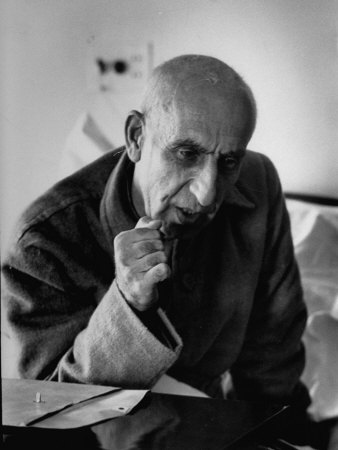 |
| Shah Mohammed Reza Pahlavi |
In 1953, the state of Iran essentially had a ceremonial government, under Shah Mohammad Reza Pahlavi, and an elected government, under Prime Minister Mohammad Mosaddegh. The Shah wore a European-style army uniform, performed ceaseless ineffectual military reviews, and lived a secular bohemian lifestyle. The devout Mosaddegh lived humbly, dedicated himself to the people, and wanted to use Iran’s resources for the Iranian people.
That last issue alienated Mosaddegh from the west, because Iranian oil was, for all practical purposes, a wholly owned franchise of the Anglo-Iranian Oil Company. Think you haven’t heard of the AIOC? After 1953, this company reorganized as British Petroleum, then, as it went multinational, as BP. And in 1951, Mohammad Mosaddegh, Iran’s democratically elected head of state, wanted to nationalize his country’s oil reserves.
This outraged the British, who, in the wake of World War II, had too little international clout left to act on it. In the post-war alignment moving into the Cold War, however, Britain had an ally in the United States, and an untested but powerful weapon in their arsenal. Britain’s legendary international intelligence agency, MI5, whispered to America’s sister agency, the CIA, that Mosaddegh had fallen into the pocket of the Soviet Union.
 |
| Prime Minister Mohammad Mosaddegh |
In the early Eisenhower years, America was prosperous, but war-weary. The army was desperate to put a bow on the increasingly unpopular Korean conflict, and deeply divided over whether to join the post-colonial Vietnam conflict. The nation would not have supported an overt war in a country few knew anything about. But a covert operation was not beyond the pale. The CIA dispatched Kermit Roosevelt, grandson of Theodore, to organize a coup.
What followed has the white-knuckle pace and structural intricacy of a James Bond thriller. Why no one has made a movie of this baffles me, because America’s bloodless overthrow of a democratically elected government makes both enlightening history and an exciting story. The story is too complex to recount in this short space, but I recommend Stephen Kinzer’s eminently readable Overthrow. The CIA codenamed this action Operation Ajax.
 In short, by the end of August 1953, the Shah, who made lopsided alliances with the NATO powers and ruled with draconian military force, governed Iran. He organized a kangaroo court that convicted Mosaddegh of treason. The legitimately elected Prime Minister spent three years in prison, and finished his life under house arrest, reputedly dying a broken and enfeebled man in 1967.
In short, by the end of August 1953, the Shah, who made lopsided alliances with the NATO powers and ruled with draconian military force, governed Iran. He organized a kangaroo court that convicted Mosaddegh of treason. The legitimately elected Prime Minister spent three years in prison, and finished his life under house arrest, reputedly dying a broken and enfeebled man in 1967.Americans generally do not recall Operation Ajax. It’s unclear how many have ever known about it. Iranians, however, remember. When Iran calls America the “Great Satan,” it is not because of our opinions on the Islamic Republic today; it’s because the people remember the events of 1953. But under the Shah’s harsh regime, populists and leftists could not organize openly. Revolutionary attempts to modernize the country were preemptively quashed.
 |
| President Mahmoud Ahmadinejad |
Nearly sixty years after America overthrew one Iranian government, we hear calls from within and without to do it again. But this time, we have the perspective of history to predict the consequences of our actions. We can only say we have not learned from history if we have not learned about history. If we repeat Twentieth Century mistakes, we cannot proclaim ignorance a second time.
Nicely done, sir. Hegemony isn't a four-letter word. Perhaps it should be.
ReplyDelete